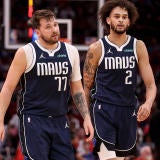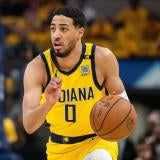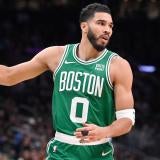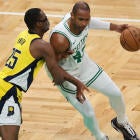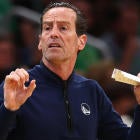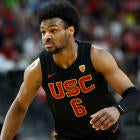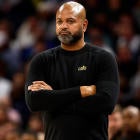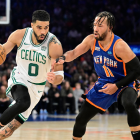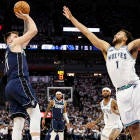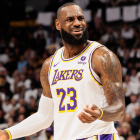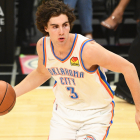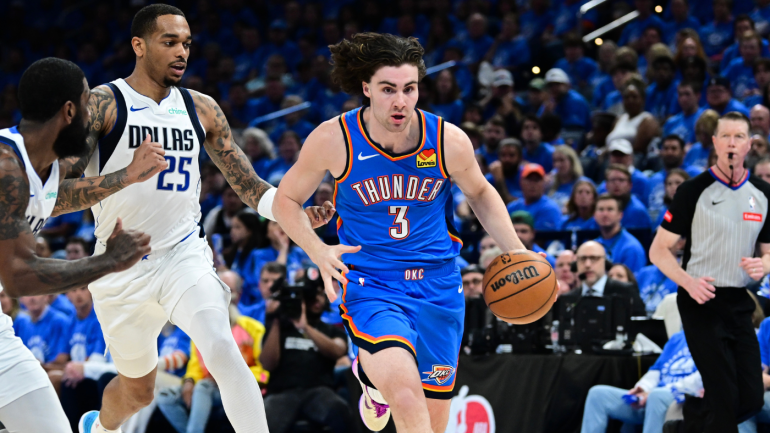
A little bit more than a year ago, the Oklahoma City Thunder were fighting just to reach the Play-In Tournament. Reaching the postseason would have been a meaningful signal of progress for a team that had spent the previous two seasons in the lottery, but Oklahoma City remained conservative in how it dealt with a minor Shai Gilgeous-Alexander ankle injury. He largely managed to play through the pain, but a critical loss against the Charlotte Hornets came with their star on the sideline. In addition, Oklahoma City used 12 different players in that late-season loss, a rarity even in a standard regular-season game let alone what might have been considered a must-win.
Though coach Mark Daigneault did not directly address the injury or his rotations for the Hornets game, he was asked if he was prioritizing a postseason appearance in the way he approached the end of the season. In short, he was not.
"I think if it is an outcome that is downstream of our process and the way that we're trying to do things it would be great because it would just be kind of a marker along the way, but it's not so important that it's gonna distract us from our way of doing things," Daigneault said of the potentially reaching the 2023 postseason. "We need to bet on that, day over day over day, we've done that for two or three years. That's what's put us in a position to compete for the play-in, so for us to abandon that at this point would be hasty, and quite frankly, we need to double-down on this mentality past this season. That's why we're doing what we're doing."
The Thunder ultimately did reach the 2023 Play-In Tournament. One year later they became the youngest No. 1 seed in NBA history, and they did so while maintaining that same principle of emphasizing process over results. No member of their team averaged more than 34 minutes, but 13 players averaged at least 10 minutes per game when they appeared, and despite being one of the NBA's healthiest teams, they used a total of 20 players in 10 or more games this season. When the entire basketball world told them to trade for a bigger, traditional backup center, they not only declined to do so at the deadline, but actively facilitated such an acquisition for a Western Conference rival, the Dallas Mavericks, when they sent out a first-round pick in a deal that landed the Mavericks Daniel Gafford.
Even as they reached the postseason, they didn't budge. They've run a 10-man rotation throughout the playoffs. They used 11 in their playoff-opening win over the New Orleans Pelicans. At a point in the season in which Tom Thibodeau routinely refuses to give Josh Hart even a single rest, Gilgeous-Alexander is the only member of the Thunder to play even 40 minutes in a single game during Oklahoma City's current second-round series against the Mavericks. The Thunder have fairly explicitly spelled out what kind of team they want to be, and at the risk of oversimplifying, their vision is an egalitarian one. They want to spread minutes out and develop as many young players as possible. They want multiple ball-handlers on the floor so no single player is monopolizing their offense. They tend to shun specialists, like brawny big men, so they can emphasize team-wide spacing and athleticism. Those ideals got them this far. The Thunder were elite in nearly every statistical category this season except rebounding.
The idea of remaining true to your core principles is noble. In the playoffs, you adapt or you die. Nowhere has that been more true for the Thunder than in the role held by one of their core players: Josh Giddey.
The No. 6 pick in the 2021 NBA Draft checks a lot of those boxes the Thunder have relied on in the regular season. He's essential to Oklahoma City's stellar transition offense, and his passing and ball-handling takes a ton of pressure off of Gilgeous-Alexander. He's the second-leading rebounder on a team that doesn't rebound. He's far from an elite defender, but he's big enough and smart enough to function in a system filled with better ones. These are all positive traits. Giddey is a good player. But he has become by far Oklahoma City's biggest vulnerability against Dallas in a series the Mavericks suddenly control.
Giddey, who has started every game he's played in a Thunder uniform, has played 41 total minutes in three games this series. The Thunder have lost those minutes by 28 points. No other player on the roster has a point-differential worse than minus-8. The Thunder have played 103 minutes in this series without Giddey and they've won those minutes by 37 points. They're still losing the series because the Giddey minutes have been so damaging.
We are again oversimplifying here, but the obvious explanation here is that all of those traits that make Giddey so important to who the Thunder want to be from October through April just aren't nearly as valuable in May. Right now, Giddey just isn't doing anything to help his team.
In fact, his mere presence has started to prove somewhat harmful. The Mavericks aren't guarding him.
This was, of course, predictable. Giddey is a career 31% 3-point shooter. Nobody guards 31% shooters in the playoffs anymore, and it compromises driving lanes for everybody else. The Mavericks offered a half-hearted closeout on Giddey on this attempt, but just look at how little attention he's getting as Dallas loads up to stop his teammates in the buildup to it. Gilgeous-Alexander drives into two defenders with a third lurking behind the action. Chet Holmgren takes one dribble toward four Mavericks before kicking it out to an ignored Giddey. Clank.
Typically, teams stomach the presence of such pure shooters at non-center positions because of defense. That's why Dallas relies so heavily on Derrick Jones Jr. He justifies his minutes by defending Gilgeous-Alexander. But Giddey? He's mostly taken the low-impact role of defending Jones Jr. Doing so has turned him into a help-defender, but he's just not deterring drives in the way those extra Dallas defenders have.
When switched onto more impactful offensive players, he's struggled to hold his own. P.J. Washington has little trouble bodying him for clean post-up points.
Though defensive metrics are obviously flawed, the tracking data doesn't exactly point to any hidden utility here. Off-ball defenders on low-impact offensive players are supposed to contest shots elsewhere and muck up passing lanes to help generate turnovers. Giddey is the only Thunder player to have spent more than 15 minutes on the court this series that hasn't racked up a single deflection. He hasn't recovered a loose ball either. He has contested six shots in three games. The more traditional counting stats are just as underwhelming. He has nine rebounds and three assists in the series. This all begs the very simple question of what the Thunder are actually gaining by having Giddey on the floor in this matchup?
At the moment, the answer is very little. You could argue they'd benefit more from his presence as a backup point guard. Ball-handling goes further when your high-usage stars are on the bench. But Giddey has played 31 of his 41 minutes in this series alongside Gilgeous-Alexander. That's largely a function of his place in the starting lineup.
And that's the obvious tweak here: get Giddey out of the starting lineup and use him exclusively when Gilgeous-Alexander rests. The Thunder have never once done that. The closest they've ever come has been benching him at the beginning of second halves, often in favor of Isaiah Joe or Aaron Wiggins.
Both of them offer significantly more utility alongside Oklahoma City's four other starters. So does Cason Wallace, the best defender of the trio. All three offer specific traits that the Thunder could really use at the moment. Joe's shooting is Oklahoma City's offensive cheat code: they score a preposterous 131.2 points per 100 possessions when he played with the starters this season, according to Cleaning the Glass. Wiggins is the healthiest mix. He's bigger than Wallace and offers a healthy dose of ball-handling while reliably making 3's and holding his own defensively. There's no wrong answer here besides Giddey.
But benching Giddey is a tacit admission of defeat, a reaction to outcomes rather than trust in a process. Giddey clearly represents something meaningful to Oklahoma City about the way they play. That's why they've never benched him. But the playoffs demand sacrifices. That often means playing a more heliocentric offense. It means asking the Gilgeous-Alexanders and the Jalen Williamses and the Holmgrens of the world to play 44 minutes and surrounding them with players that either specialize in things that augments them or at least come without the sort of distinct flaws that weaken them. It means abandoning niche players and emphasizing what works.
This isn't exclusively a Mavericks problem. It's not even just a 2024 playoffs problem. Giddey is eligible for a contract extension this offseason. The Thunder have thus far been an almost entirely internally developed team. They got precisely five starts this season out of players they didn't draft (or sign as undrafted free agents) besides Gilgeous-Alexander, whom they acquired after his rookie season: one from Joe, another from Kenrich Williams and three more from Gordon Hayward. Despite their war chest of draft assets, they haven't swung for the fences on an external addition. Everything they've done to this point suggests that their goal is to retain as much of this team as possible and simply build around this group moving forward.
That's viable for now. It will be viable for two more years, which cover the duration of the rookie deals Holmgren and Williams. But eventually, the Thunder are going to have to make some hard decisions. Giddey's extension negotiations will represent the first real test of Oklahoma City's resolve. Are they so committed to their process that they are prepared to pay a player they may never be able to maximize in a playoff setting? The opportunity cost here is potentially significant. The Thunder can create significant cap space this summer and potentially add a different long-term piece. Odds are, they're not doing that and extending Giddey. How malleable are the Thunder willing to be?
We'll find as this series progresses, because everything we've seen on the floor thus far suggests that the Thunder probably need to bench Giddey in order to win this series. One year ago, the Thunder refused to meaningfully alter their approach for the sake of making the playoffs. They believe in the program they're building. But now, they're facing far higher stakes. Changing the way they do things might be their only path to competing for the 2024 championship.










